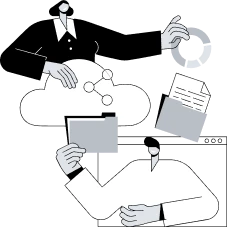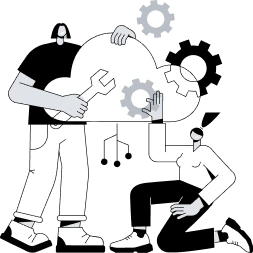- Exploring the Custom Software Development Cost in France and the Factors That Influence It
- Software Type
- Type of Developers
- Project Complexity
- Tech Stack
- Developer Seniority
- Hiring Model
- Additional Factors That Impact the Cost to Develop Custom Software in France
- Market Conditions
- Third-Party Services
- Hardware Requirements
- Legal Compliance
- Cultural Adaptations
- Security Measures
- Project Management and Communication Tools
- Reducing Software Development Costs for Businesses in France
- Adopt Agile Methodologies
- Prioritize Features
- Outsource Development
- Utilize Open Source Tools
- Streamline Communication
- Essential Features for Getting Maximum Returns on the Cost Spend to Develop a Custom Software
- Why Appinventiv is Your Ideal Software Development Partner in France
- FAQs
There is a famous French saying: “L’avenir appartient à ceux qui se lèvent tôt” (The future belongs to those who get up early). In a world where the morning croissant comes with a side of scrolling through the news on a smartphone, staying ahead means harnessing the power of digital innovation. For businesses, developing custom software in France has become a crucial step not just for a technological upgrade but as a strategic necessity. Whether enjoying a hot mocha in a cozy bistro or coding the next big tech sensation, going digital provides a direct line to your clients and smooths out day-to-day operations.
With the evolving dynamics of consumer behavior, French businesses need to realize that well-designed software can elevate the customer experience, increase engagement, and boost loyalty. Dedicated software can also bridge tradition and modernity, bringing age-old crafts to new audiences. It’s not just about going online; it’s about creating a portal where your brand can tell its story, showcase its products, and interact directly with customers anytime and anywhere.
However, while the benefits are clear, the path to launching a successful software is paved with financial considerations. Custom software development costs in France can vary widely based on several factors.
Simple software with basic functionalities might cost around $50,000 to $80,000 (approximately €47,000 to €77,000). Still, more sophisticated solutions involving advanced features like AI, e-commerce integration, or multi-language support can require a more substantial investment ranging from $300,000 to $400,000 or more (approximately €287,000 to €384,000 or more).
Furthermore, when analyzing the costs, it’s important to consider your project’s scope. Are you aiming for a minimalist design or a complex interface with advanced features? Choosing native development for optimized performance or cross-platform solutions for broader accessibility impacts your budget. Don’t overlook ongoing expenses like maintenance, updates, and marketing, as they are crucial to your software’s success.
This blog aims to demystify software development pricing in France. We will explore everything from the initial design and development phases to post-launch support and scalability. By understanding these factors, French businesses can better plan their investments, ensuring their digital presence meets and exceeds their strategic goals.
Let’s demystify the numbers and craft software that drives success.
Exploring the Custom Software Development Cost in France and the Factors That Influence It
As revealed earlier, the investment required to develop software in France can vary across a broad spectrum, generally ranging from $50,000 to $400,000 (approximately €287,000 to €384,000) or more, based on the diverse nature of projects, from basic utilities to complex, feature-rich software.
Understanding how software development costs are distributed across different stages of the development process is key to effective budget management. Each phase of creating software incurs unique costs, influenced by the complexity of tasks and resources required.
Here’s a concise software development cost breakdown in France as per the development lifecycle:
1. Discovery and Planning (10–15%): Initial analysis and planning form the foundation of your project, setting clear goals and expectations.
2. Design (10–15%): This creative phase shapes the visual and functional aspects of the software, impacting user engagement.
3. Development (40–50%): The most resource-intensive phase where the actual coding and building of the software occur.
FREE Takeaway: A Guide on Custom Software Development for Startups
4. Testing and QA (20–25%): Essential for ensuring the software’s reliability and performance across different environments.
5. Deployment and Maintenance (10–20%): Final tweaks and ongoing upkeep to enhance the software’s performance post-launch.
If you are still wondering whether it’s the right time to invest in custom software for your business in France, the digital landscape data presents a compelling argument. With smartphone and internet penetration growing, harnessing these technologies can significantly enhance your business’s reach and operations. Let’s give you a small glimpse into the “why”.
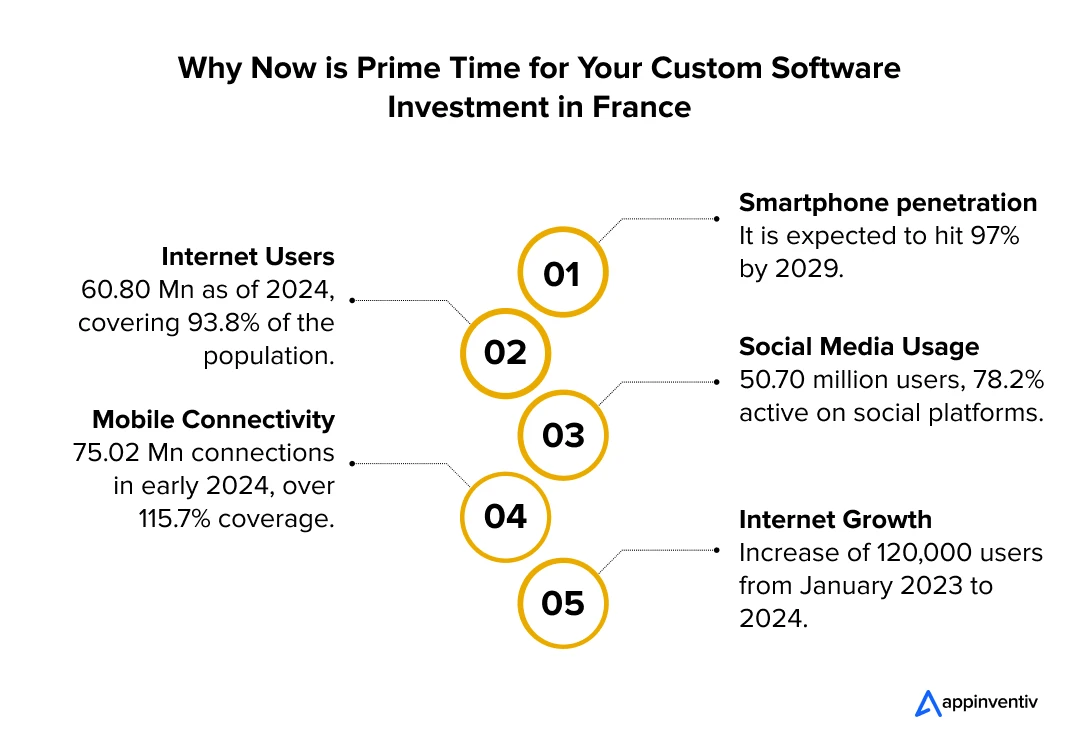
Let’s move on and delve into the factors that impact the overall software development cost estimation and provide you with a structured look at pricing within the French market.
Software Type
The cost of developing software in France can significantly vary depending on the software you want to create. Let’s explore the different software categories and how each influences development expenses.
| Type of Software | Examples | Cost Range (EUR) | Timeframe | Key Features | Typical Use Cases |
|---|---|---|---|---|---|
Web Applications | E-commerce sites, blogs, corporate websites | €45,000 – €225,000 | 3-9 months | Built using HTML, CSS, JavaScript; requires continuous internet connection | Information portals, online stores, content management |
Mobile Applications | Social media apps, utility apps, gaming apps | €75,500 – €270,000 | 6-12 months | Can be native or cross-platform; optimized for mobile devices | Social networking, daily utilities, mobile gaming |
Industrial Software | ERP systems, CRM software, AI SaaS products | €250,000 – €380,000+ | 12-24 months | High security, robust data management, integration capabilities | Enterprise resource planning, customer relationship management, data analysis |
Type of Developers
When embarking on a software development project in France, businesses have several options regarding their development teams: hiring in-house teams, working with freelancers, or outsourcing to a specialized company. The overall custom software development cost in France and project outcomes can vary significantly based on your chosen path. Let’s look at the options in detail below:
In-House Teams
In-house teams are composed of employees who are permanently on the company’s payroll. These teams work within the organizational structure, allowing tight integration with ongoing business operations and direct oversight of development projects.
Pros:
- High control over project management
- Seamless team integration
- Strong alignment with company culture
Cons:
- Higher long-term costs like salaries, benefits
- Limited flexibility in scaling
- Significant investment in recruitment and training
Freelancers
Freelancers are independent professionals hired on a project or task basis. They offer flexibility and can be a cost-effective option for specific tasks or when needing specialized skills that the in-house team lacks.
Pros:
- Cost-effective for short-term projects
- High flexibility with hiring
- Access to specialized skills
Cons:
- Variable quality and reliability
- Coordination and management challenges
- Potential lack of commitment to long-term goals
Outsourced Teams
Outsourcing is profitable for startups and involves contracting an external organization to handle part or all of the software development process. These companies specialize in software development and often bring many resources and expertise.
Pros:
- Access to wide-ranging expertise
- Cost-optimized for large-scale projects
- Scalability and flexibility
Cons:
- Less direct control over the team
- Possible cultural differences
- Dependency on the team’s availability
After reviewing the pros and cons of each developer type, let’s look into a side-by-side comparison to understand better how they might suit different project needs. Businesses must realize that software outsourcing is ideal for achieving scalability, accessing specialized skills, and managing project costs effectively, especially when internal resources are limited or require augmentation for complex projects.
Furthermore, the software outsourcing costs are ideally lower than hiring an in-house team. Moreover, outsourcing software development to a dedicated firm also helps you ensure quality compared to freelancers.
| Developer Type | Control | Cost Efficiency | Cost Range | Flexibility | Expertise Level | Project Suitability |
|---|---|---|---|---|---|---|
| In-House Teams | High | Low | Very High ($600,000+) | Low | High | Best for long-term projects with consistent needs |
| Freelancers | Medium | High | Variable ($50,000 + ) | High | Variable | Only suitable for short-term or specialized tasks |
| Outsourced Teams | Low to Medium | High | Medium ($200,000 – $300,000) | High | High | Ideal for projects requiring scalability and varied expertise |
Project Complexity
The complexity of a software development project is a significant factor that influences both the software development cost estimation and timeline. As complexity increases, so does the need for more sophisticated technology solutions, more skilled developers, and potentially more time to ensure quality and functionality. Understanding how complexity affects development is crucial for setting realistic budgets and timelines.
Understanding the Impact on Cost and Timeline:
Low Complexity Projects
These typically involve straightforward software with basic features. They are quicker to develop and require fewer resources, resulting in lower costs.
Medium Complexity Projects
These may include software requiring custom designs, database integration, or mobile responsiveness. The increased requirements lead to higher costs and extended development time.
High Complexity Projects
Involving cutting-edge technologies, multiple integrations (like third-party services, and complex backend systems), or extensive data processing, these projects demand the highest level of skill and significantly more time, reflected in their higher cost.
| Complexity Level | Typical Features | Cost to Create a Software in France | Estimated Timeline for Development |
|---|---|---|---|
| Low Complexity | Basic functionality with minimal integration and simple UI | $50,000 – $80,000 | 1-3 months |
| Medium Complexity | Moderate integration, more complex UI, mobile compatibility | $90,000 – $150,000 | 3-6 months |
| High Complexity | Advanced features like AI, multiple integrations, high-end security | $150,000 – $300,000 | 9 months to 1+ year |
Tech Stack
The choice of technology stack, which comprises software, frameworks, and languages used to build the software, plays a critical role in shaping the overall software development pricing in France. Different tech stacks can vary greatly in licensing fees, developer availability, scalability, and maintenance requirements, all impacting the overall project cost.
How they impact costs:
- Licensing Fees: Some technologies require substantial licensing fees, while others are open-source and free to use, which can significantly affect initial costs.
- Developer Availability: Popular technologies might have a larger pool of available developers, potentially lowering costs due to competition. On the other hand, advanced or newer technologies may command higher rates due to a smaller pool of qualified professionals.
- Scalability and Maintenance: Technologies that are easier to scale and maintain can reduce long-term costs, whereas complex or less popular tech stacks may increase these costs due to specialized skills required for maintenance.
Let’s take an overview of how different technologies might impact the cost of custom software development in France based on their general market availability and associated factors.
| Technology | Licensing Cost | Developer Availability | Scalability | Maintenance Cost | Impact on Project Cost |
|---|---|---|---|---|---|
HTML/CSS/JavaScript | None (Open Source) | High | Moderate | Low | Low |
.NET | Moderate (Licensing Required) | Moderate | High | Moderate | Medium |
Java | None (Open Source) | High | High | Moderate | Medium |
Python | None (Open Source) | High | High | Low | Low to Medium |
Ruby on Rails | None (Open Source) | Low | Moderate | High | Medium to High |
Swift (for iOS) | None (Open Source) | Moderate | High | Moderate | Medium |
React Native | None (Open Source) | High | High | Moderate | Low to Medium |
Developer Seniority
Developer seniority significantly impacts the custom software development cost in France as well as the outcome of projects. Seniority affects the hourly rate or salary and influences the quality, speed, and efficiency of the development process. Understanding how different levels of developer expertise impact project costs and timelines is crucial for budget planning and project management.
Impact on Cost:
- Hourly Rates and Salaries: Generally, the more experienced the developer, the higher the cost. Senior developers command higher rates due to their advanced skills and ability to handle complex projects with less oversight.
- Efficiency and Speed: Senior developers are often more efficient and able to identify and solve problems quickly, which can reduce the total number of hours needed for project completion. This efficiency can offset their higher hourly rates.
- Project Management and Oversight: Less experienced developers may require more time and supervision, potentially increasing the management overhead and indirectly raising costs.
Let’s look into detail how different levels of developer seniority might influence the overall cost to create software in France.
| Seniority Level | Hourly Rate | Efficiency | Supervision Required | Typical Project Role | Impact on Total Cost of Custom Software Development in France |
|---|---|---|---|---|---|
Junior Developer | $20 – $50 | Low | High | Task-specific coding, simple debugging | Lower initial rate, higher total due to increased hours and oversight |
Mid-Level Developer | $50 – $100 | Moderate | Moderate | More complex integrations, feature development | Moderate rate, balanced efficiency and supervision needs |
Senior Developer | $100 – $150 | High | Low | Architectural decisions, critical feature development, team leadership | Higher rate, lower total cost due to higher efficiency and autonomy |
Lead Developer | $150+ | Very High | Minimal | Overall project management, strategic planning, mentoring | Highest rate, potentially lower overall project cost due to strategic efficiency |
Hiring Model
The hiring model chosen for a software development project significantly influences the upfront and ongoing software development pricing in France and the company’s flexibility and control over the project. Different models cater to varying project needs, timelines, and budget constraints, each with advantages and drawbacks.
Some of the common hiring models for businesses in France include:
- Fixed-Price Model:
In this model, the project scope, timeline, and costs are agreed upon before the work begins. Changes to scope or features are typically handled through formal change requests that might adjust the original price and timeline.
It is best for projects with well-defined scopes where detailed specifications are available upfront. Additionally, it is suitable for smaller or shorter projects with predictable requirements.
- Time and Materials (T&M) Model:
Costs are based on the time developers spend on the project and the materials (including technologies and tools) used in the process. This model offers flexibility to adjust requirements, scope, and resources throughout the project lifecycle.
It is best for projects where it is difficult to estimate the scope and requirements upfront or where changes are expected during development. Additionally, it is ideal for long-term projects with evolving goals.
- Dedicated Development Team Model
In this model, businesses hire a dedicated team of developers exclusively for their projects, ensuring consistent focus and deep integration with their company’s culture and goals. The team is an extension of your in-house staff but is managed by the outsourcing service provider.
It is best for projects that require continuous development, high involvement, and close collaboration. Additionally, it is ideal for long-term engagements where the scope may expand over time, requiring a stable and committed team to support the project’s growth and evolution. Let’s look into the multiple aspects of custom software pricing models in France below.
Additional Factors That Impact the Cost to Develop Custom Software in France
While core aspects such as project scope, technology stack, and developer expertise significantly impact the custom software development cost in France, several other factors also play a crucial role. Let’s look at the additional factors affecting software development cost in France.
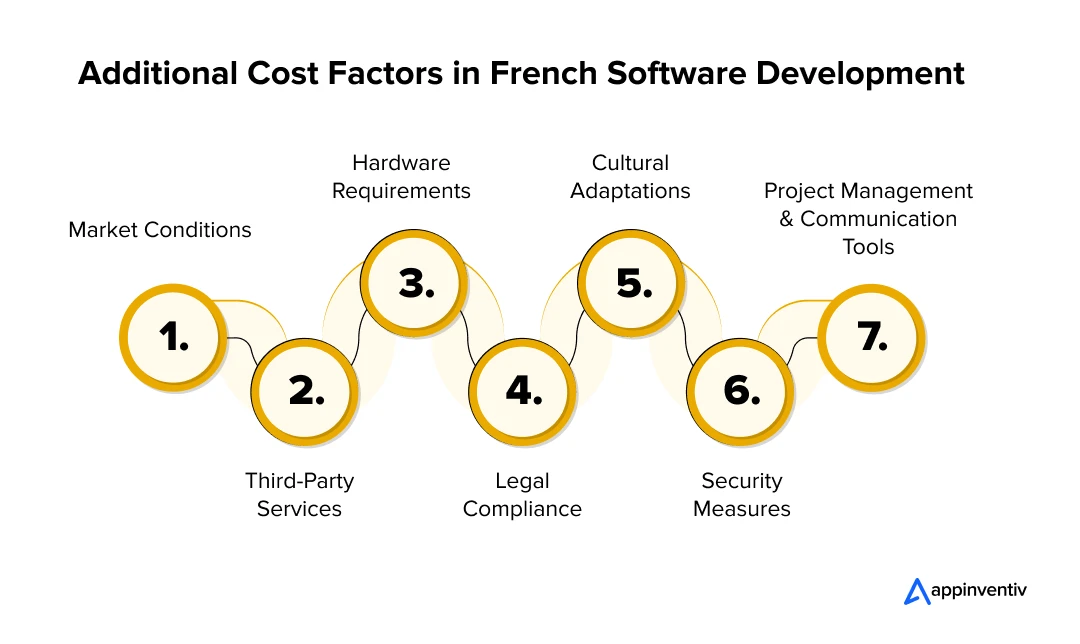
Market Conditions
Economic fluctuations and market demand can influence the overall software development pricing in France. For instance, a surge in demand for certain technologies or skills can drive up developer rates temporarily.
Third-Party Services
Depending on the project, you might need to utilize third-party services or develop APIs, which come with their costs. For example, payment gateways, mapping services, or data analytics platforms can add to the overall cost due to subscription fees or pay-per-use charges.
Hardware Requirements
Projects requiring specific hardware for development or deployment, such as IoT devices or specialized servers, will add to France’s overall custom software development cost. This includes both the purchase price and ongoing maintenance.
Legal Compliance
When developing software that incorporates AI, there are stringent EU regulations that must be adhered to. These rules, designed to ensure transparency, fairness, and accountability in AI systems, can introduce additional compliance costs. The EU AI Act requires businesses to offer extensive documentation, further testing phases to ensure compliance, and possibly even project scope or design alterations to meet legal standards.
Cultural Adaptations
For software targeting global markets, there may be costs associated with cultural adaptation, including translation, localization, and modification of content to suit local tastes and legal requirements.
Security Measures
The need for high-level security measures can significantly increase development costs, especially for software dealing with sensitive or financial data. This includes encryption, secure architecture design, and regular security audits.
Project Management and Communication Tools
Efficient management of a software development project often requires investment in project management and communication tools. While these tools help streamline the development process and enhance collaboration, they come with subscription or license fees.
Partner with us to create a custom software solution that stands out, from intuitive design to top-notch performance.
Reducing Software Development Costs for Businesses in France
Reducing software development costs without compromising quality is a critical concern for businesses aiming to maximize their ROI and enhance operational efficiency. Let’s offer several strategies to help French businesses like yours effectively cut costs associated with custom software development.
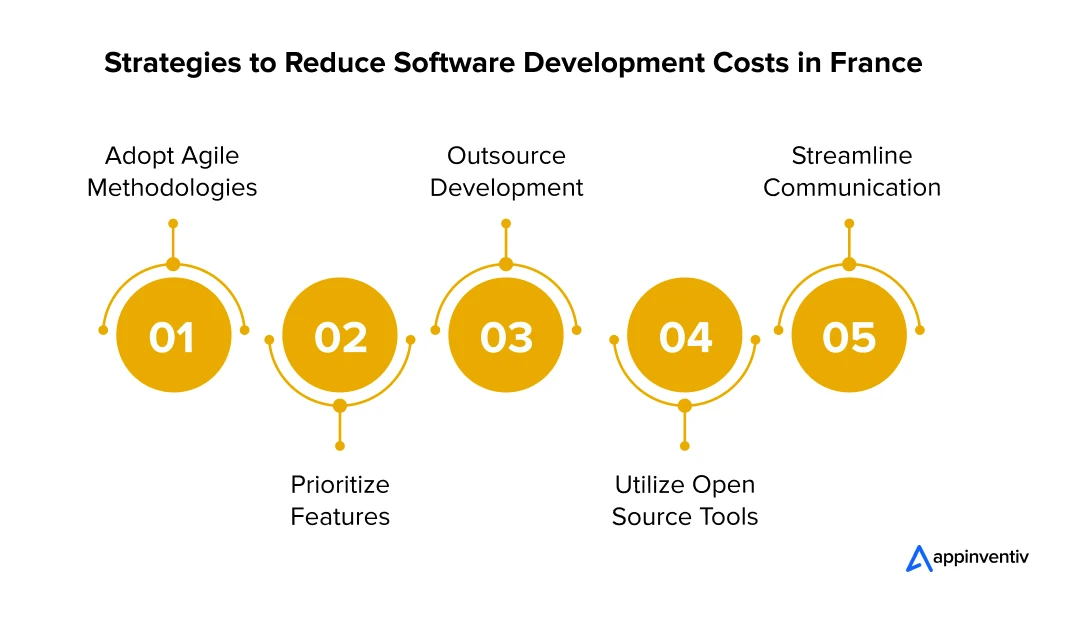
Adopt Agile Methodologies
By implementing agile practices, businesses can break the development process into smaller segments, allowing for frequent reassessment and adjustments. This approach helps minimize the risk of large-scale project failures and reduces costs by addressing issues early in the development cycle.
Prioritize Features
Develop a minimum viable product (MVP) first, focusing on core functionalities that deliver the most user value. Additional features can be developed later based on user feedback, ensuring the budget is spent on truly needed features.
Outsource Development
Leveraging the expertise of outsourced teams can reduce costs significantly compared to maintaining an in-house team. Outsourcing allows flexibility in scaling the team according to project needs and access to a wider pool of talents at a lower cost.
Utilize Open Source Tools
Where possible, integrate open-source tools and frameworks. They can significantly reduce France’s overall custom software development cost as they do not require licensing fees. Additionally, these tools are usually well-tested and supported by large communities, offering reliability without the high costs.
Streamline Communication
Use modern project management and communication tools to ensure all team members are on the same page. Efficient communication reduces delays, prevents misunderstandings, and enhances the development team’s productivity.
Essential Features for Getting Maximum Returns on the Cost Spend to Develop a Custom Software
Investing in custom software development services in France is not just about addressing current needs—it’s about future-proofing your business and standing out in a competitive market. To ensure that the investment in custom software yields long-term benefits, it is crucial to integrate features that enhance efficiency, user engagement, and overall business intelligence.
Here are some of the key features that businesses should consider incorporating into their custom software to make it a worthwhile long-term investment:
| Feature | Benefits | Long-Term Impact |
|---|---|---|
| Artificial Intelligence (AI) | Automates complex processes and provides personalized user experiences. | Enhances scalability and adaptability to future needs. |
| Data Analytics Tools | Enables real-time data processing and insights into business operations. | Informs decision-making and strategy adjustments over time. |
| Cloud Integration | Facilitates flexibility, scalability, and remote access to business resources. | Reduces infrastructure costs and improves data security. |
| Mobile Optimization | Ensures accessibility and enhances user experience across mobile devices. | Increases customer engagement and retention. |
| Blockchain Technology | Offers enhanced security for transactions and data integrity. | Builds trust and transparency, which is crucial for sectors like finance and supply chain. |
| IoT Integration | Connects various IoT devices for improved automation and data collection. | Optimizes operations and energy efficiency, reducing operational costs. |
| Custom APIs | Allows seamless integration with other software and third-party services. | Enhances functionality and interoperability with evolving tech ecosystems. |
| User Customization Options | Provides users the ability to tailor their experience based on personal preferences. | Improves user satisfaction and loyalty, driving repeat business. |
| Multi-language Support | Makes the software accessible to a global audience. | Expands market reach and accommodates international growth. |
Why Appinventiv is Your Ideal Software Development Partner in France
Choosing the right partner to avail software development services in France is essential for leveraging technology effectively. Appinventiv stands out in the French market for its commitment to delivering innovative, cost-effective solutions. Here’s why we are the ideal choice:
- Competitive Pricing: Appinventiv offers transparent and adaptive pricing models that ensure quality without compromising your budget, making high-quality software development accessible for businesses of all sizes.
- Wide-ranging Expertise: Our team is proficient in the latest technologies, including mobile and web app development, AI, and machine learning, allowing us to handle complex projects and deliver state-of-the-art solutions.
- Proven Track Record: We are known for our reliability and consistently delivering projects on time and within budget across various industries. Our extensive portfolio and positive client feedback underscore our ability to add significant value.
- Agile Methodologies: Our agile approach enhances project flexibility and efficiency, ensuring that our solutions perfectly align with client needs through continuous adaptation and improvement.
- Strong Communication: We prioritize clear, consistent communication to ensure that every project phase meets your expectations and advances your business goals.
- Strategic Partnership: Appinventiv isn’t just a service provider and partner dedicated to your long-term success. We are committed to helping you navigate the complexities of software development and achieve lasting growth.
Get in touch to discover how we can help transform your software ideas into reality, driving growth and efficiency for your business.
FAQs
Q. How much does software development cost in France?
A. The custom software development cost in France can vary widely depending on the project’s complexity, chosen technology stack, and the expertise level of the developers involved. For basic software, costs can start from around $50,000 to $80,000 (approximately €47,000 to €77,000).
More complex software, especially those requiring integration with existing systems or featuring advanced technologies like AI, may cost between $300,000 to $400,000 or more (approximately €287,000 to €384,000 or more).
Highly complex systems can exceed €400,000, particularly when they involve cutting-edge technology or extensive custom development.
Q. How long does it take to build custom software?
A. The timeline for developing custom software in France also varies based on several factors, including the project scope, the technology used, and the development methodology. Simple projects might take 5-7 months to complete, while more involved projects with moderate complexity could range from 9-10 months. The development could extend from 1 year to 18 months for highly complex projects requiring robust architecture and multiple integrations.
Q. How can businesses in France partner with a firm that can help them optimize software development costs?
A. Partnering with a wise firm that offers custom software development services in France can significantly optimize costs while ensuring quality. Here’s how:
- Evaluate expertise and track record: Choose a firm with proven experience in your industry and technology requirements.
- Consider agile firms: Opt for firms that use agile methodologies to ensure flexibility and cost efficiency.
- Assess communication and support: Ensure the firm offers strong communication and continuous support.
Check for strategic partnerships: Select a firm that views its role as a strategic partner, not just a service provider.



Custom Development or White Label Solutions: Which is Right for Your Business?
Key takeaways: 77% of companies are prioritizing digital transformation; the right tech approach is crucial for staying competitive. Custom development offers tailored solutions for unique needs, flexibility, and long-term scalability. Whereas, white-label solutions provide quick market entry, cost-efficiency, and easy customization for standard needs. Appinventiv’s expertise helps you navigate custom development vs white-label to choose…
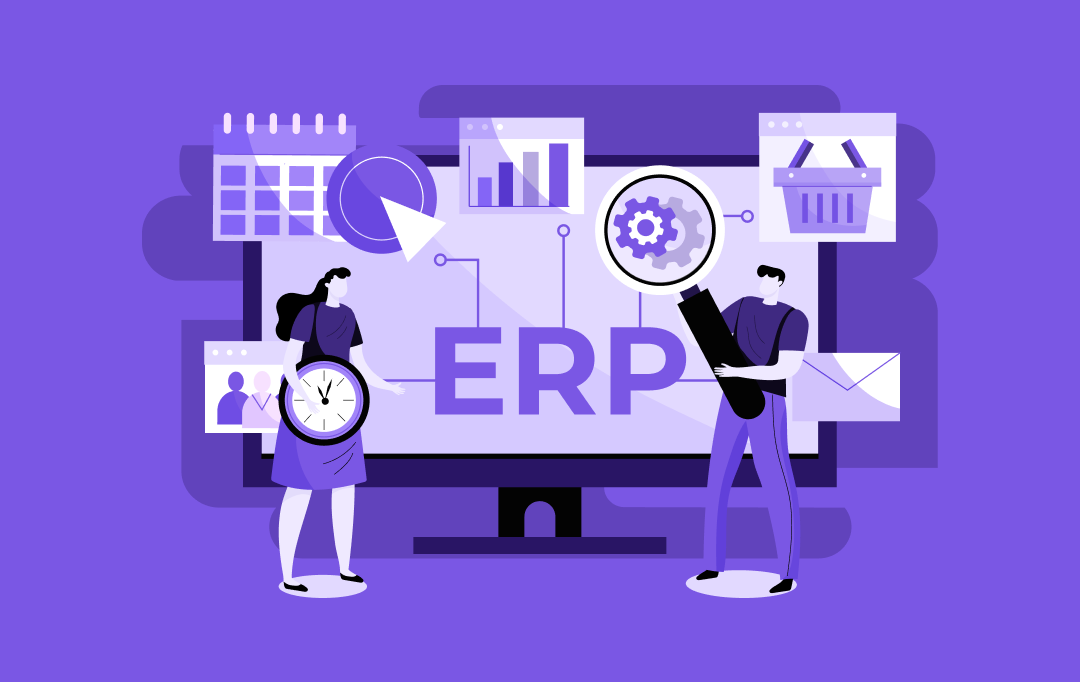
ERP Integration in Australia - Why It Is Essential and How to Do It Right
Key takeaways: ERP integration enables operational efficiency, reduced costs, and enhanced decision-making. Healthcare, finance, manufacturing, retail, and all the other sectors are benefiting from ERP integrations in Australia. While ERP integration can be costly, ranging from AUD 45,000 - AUD 450,000, it leads to significant long-term savings and scalability. Compliance with Australian regulations is critical,…
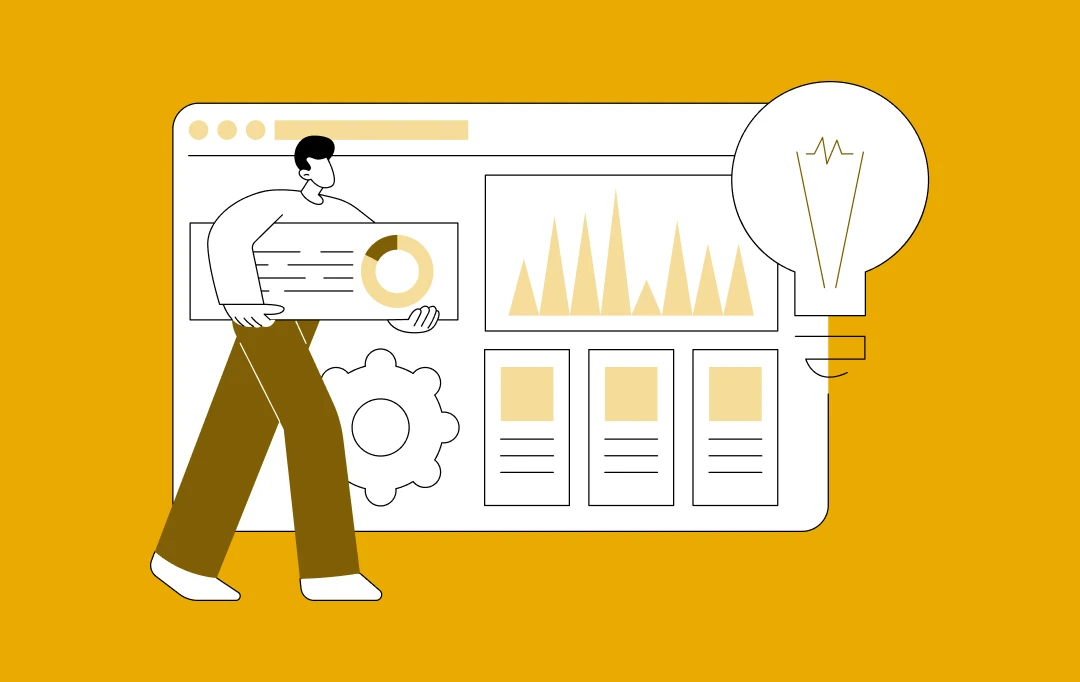
Predictive Analytics Software Development - Features, Benefits, Use Cases, Process, and Cost
Key Takeaways Predictive analytics helps businesses shift from “what has happened” to "what will happen," enabling proactive strategies rather than reactive ones. Real-time analytics and AI integration are driving the growth of predictive analytics, making it more accurate, accessible, and critical for business success. Custom predictive analytics solutions can enhance customer satisfaction, reduce costs, and…







